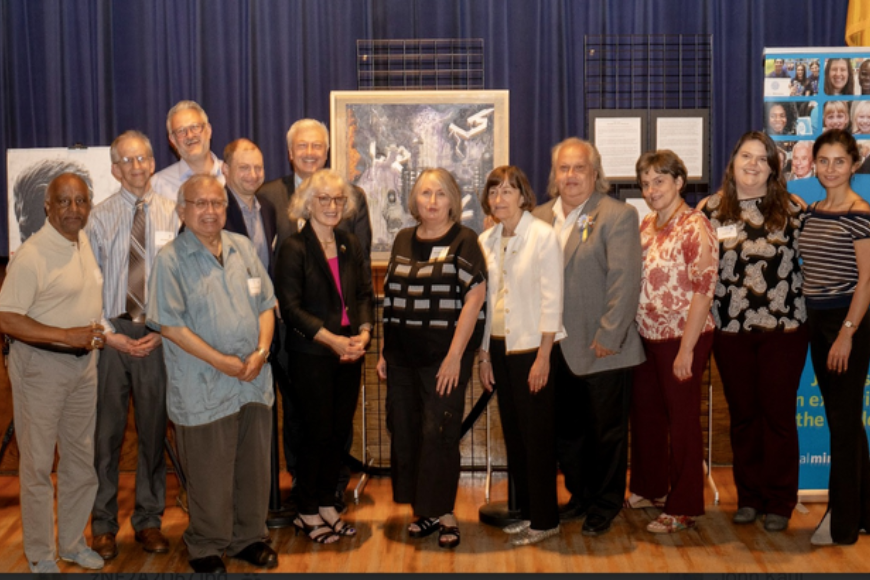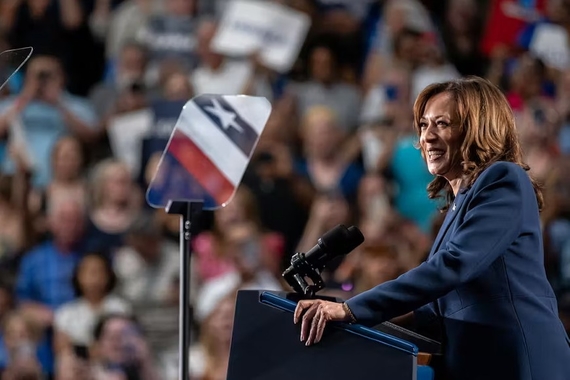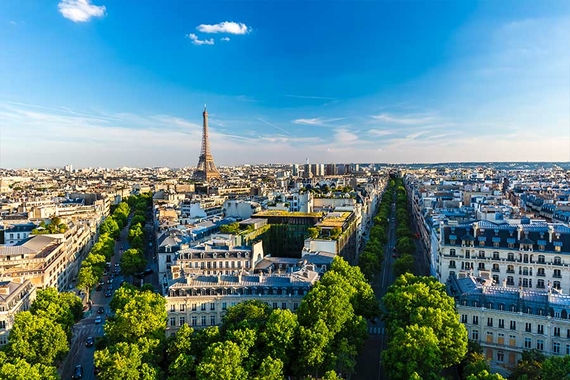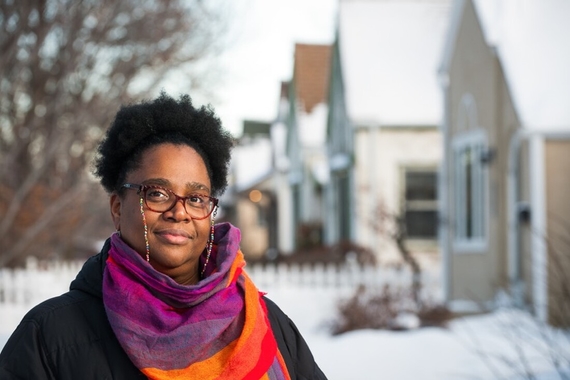With Ukraine in Heart
“I try to tell myself to just stop. To take a breath. To remind myself to convert pain into strength and help Ukraine win.”
Luda Anastazievsky, a long-time educator, chair of the Minnesota Ukrainian American Advocacy Committee (MN UAAC), and a board member of the Ukrainian American Community Center (UACC), puts her home and her family in Ukraine before all else. She leads the advocacy efforts here in Minnesota to stop the genocidal war brought on by the full-scale Russian invasion. And, like thousands of other Ukrainians in the U.S. and across the globe, she looks for a chance to raise awareness about Ukraine’s past and present tragedies.
Invited to the Liberal Arts Engagement Hub’s Voice to Vision residency to tell her story, she teaches about the connections between the historic genocide of Ukrainians, the Holodomor, and the current genocide fueled by Russia’s colonial ambitions.
Not Just a Memory
Born in the city of Mariupol, Ukraine, Anastazievsky has memories and loved ones in her country of birth. When the siege of Mariupol began in February 2022, it was a life-changing and devastating loss. Key public buildings, including schools and hospitals, were destroyed. Anastazievsky also lost her cousin to the bombs that decimated 90 percent of her home city.
“When atrocities of this magnitude affect the lives of your loved ones, and you are far away, you feel very angry and helpless at the same time,” she says, “but you also want to take action.”
This was not the first instance where her family had been affected by Russia's crimes. Her grandparents were survivors of the Holodomor (which means extermination by hunger), a period in 1932-33 when the Soviet government created an artificial famine to starve Ukrainians to death. While Ukrainians were killed at a rate of 28,000 people per day, the grain that could have saved them was forcibly confiscated and sold abroad to finance Soviet industrialization.
In this present day, the genocide of Ukrainians repeats again. The same tactics we see Russia use now were used in their past attempts to erase Ukrainian people and culture. These include forced deportation, separation of families, and attempts to impose Russian language and identity on whole populations.
“Generations of Ukrainians had to live with suppressed, unspeakable trauma without a chance to process it,” Anastazievsky says. “This crime was covered up and denied by the Soviet government. It is still denied and unrecognized by its successor state: the Russian Federation. Today, however, the lessons of the past spur Ukrainians to fight back and win.”
Back in 2014, Anastazievsky engaged in advocacy with a small group of activists. Concerned about Russia’s invasion into Ukrainian territory at the time, she created and became the founding chair for the Minnesota Ukrainian American Advocacy Committee. They represent 17,000 Ukrainian Americans in Minnesota, including major Ukrainian organizations and churches. Since its creation, the committee has continued to educate elected officials in Minnesota and Washington, D.C.
Also, as a UACC board member for six years, Anastaviesky leads the Genocide Education committee. With the current genocidal war unleashed by Russia, Anastazievsky and her teams are working harder than ever to assist Ukraine in any way possible.
“Minnesota Ukrainians believe that United States must recognize the ongoing Russian genocide of Ukrainians,” Anastazievsky says, “and help end it, not just memorialize it after the ruination and devastation of a nation.”
Convert Pain Into Strength
In her time educating and gathering support from the community, Anastazievsky met the founder of the Voice to Vision (V2V) project, Professor David Feinberg. The V2V project was established for people who had experienced trauma as a result of war and persecution. Its goal was to create a safe space where people could share their stories and turn them into visual art. For Anastazievsky, it became a special place to tell her story of loss and resilience.
“I’ve met amazing people through the Voice to Vision project,” she says. “From the very first moment I stepped into the room, I was met with unconditional warmth and support.”
With help from Feinberg, and all the other contributors to this 101st V2V project, Anastazievsky made a piece called, “Because We Are Ukrainians.” Created with mixed media, it’s a reflection on the “personal and collective trauma of two genocides that my family and Ukrainian society have experienced,” she explains. “It’s the trauma of ninety years ago during the Holodomor, and now, with the full-scale Russian invasion that had started February 2022.” The artwork was unveiled at the Ukrainian American Community Center on June 14, 2023. It’s been added to the U of M’s Conservatory Library with an art description about its meaning and purpose.
By sharing her story with people who understand even just part of her experience, Anastazievsky has felt a powerful bond with the V2V community. “I am grateful to Professor Feinberg and all of my collective partners,” she says, “who helped me find my voice for this new artwork.” Connecting with others can help us feel grounded and weather some of the painful memories in our lives. For someone like Anastazievsky, whose countrymen are still undergoing tragedies every day, that kind of support is valuable.
“When you talk to the soldiers who are fighting for Ukraine, they’ll say, ‘We want you to live your normal life. That’s what we’re fighting for,’” Anastazievsky says, “but sometimes, I feel like I can’t, because how can I enjoy it when people are being killed? So I try to tell myself to just stop. Take a breath. To remind myself to convert my pain into strength, so my efforts can be worthy of our defenders and help Ukraine win.”
Parallel Worlds
Anastazievsky’s story is different from the others in V2V; it’s still unfolding. The war in Ukraine is ongoing, and she hears about the cruelty of the Russian military every day. “I feel like I live in these parallel worlds,” she explains, “where sometimes things are mundane and regular. But I wake up from sleep to horrible news from Ukraine all the time. It’s devastating. It’s heart-breaking...and relentlessly galvanizing.”
There’s barely a moment to rest for Anastazievsky. In March of 2022, Luda was a main testifier for the bill to divest Minnesota pension funds from Russia, initiated by JCRC. The bill was signed by Governor Walz in April of 2022. A year later, a new bill proposing a mandate on genocide education as a social studies standard was put forward in the state of Minnesota. It was a joint effort between the Jewish Community Relations Council of Minnesota & the Dakotas (JCRC) and the Center for Holocaust and Genocide Studies at the University. As the chair of UAAC, Anastazievsky was invited to testify in support of it. In May of 2023, the bill was successfully passed.
“As a professional educator and community activist,” Anastazievsky says, “I believe it's important to educate the public by sharing the stories of the communities who survived genocide and to advocate for peace and justice.”
The advocacy work that Anastazievsky and her Ukrainian fellow activists locally and across the world spearhead aims not only to stop current atrocities and human rights abuses but also to prevent future ones. The genocidal war in Ukraine violates many international laws meant to preserve peace. If allowed to continue, who knows what that may mean for the rest of the world? “As a granddaughter of genocide survivors,” says Anastazievsky, “I know that one way to stop ongoing genocides and prevent future ones is through education and advocacy.”
The Liberal Arts Engagement Hub
Voice to Vision is one of five Hub Residencies for the 2022-2023 academic year, and they recently received a Residency renewal for 2023-2024. The Liberal Arts Engagement Hub seeks to facilitate reciprocal and trusting partnerships between humanistic scholars in the arts, humanities, and social sciences and the community to respond to important social challenges.
By Jennifer Nguyen
This story was written by an undergraduate student in CLA.



